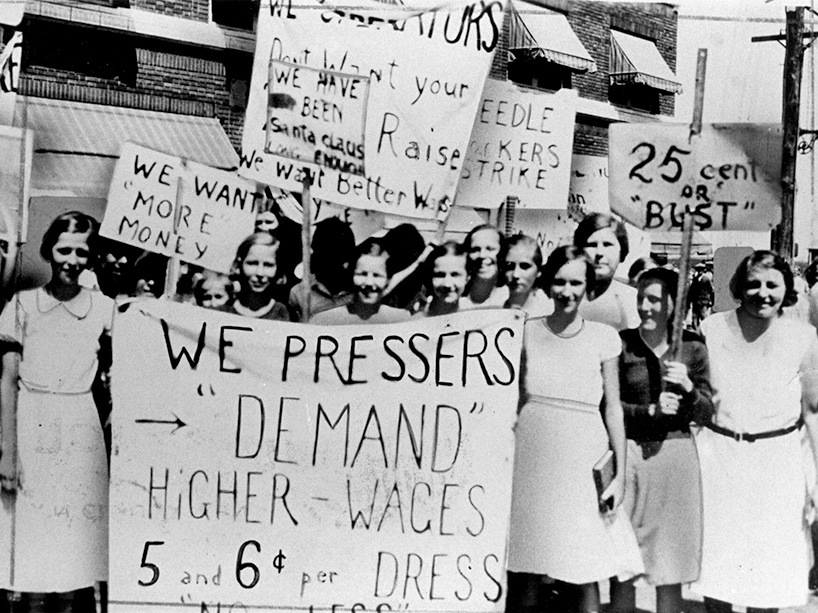This International Women’s Day, TMU philosophy prof reflects on the day’s history

This International Women’s Day, TMU philosophy professor Jeta Mulaj talks about the history of the day and what we can glean from it. Women pressers on strike for higher wages, image courtesy of The Kheel Center for Labor-Management Documentation and Archives (external link) in the ILR School at Cornell University is the Catherwood Library
On March 8, 1857, 15,000 female garment workers took to the streets to demand shorter hours, better pay and voting rights as part of a mass protest for labour rights and suffrage. This was one of the inciting events for International Women’s Day (IWD), which has become a day to celebrate a wide range of achievements for women. But for Jeta Mulaj, TMU philosophy professor whose expertise is feminist philosophy, it’s important to remember the day started as a protest.
And in 2024, there’s no better time to reflect on the day’s history, as labour comes back into focus in a big way (external link) .
Mulaj works in feminist philosophy in the tradition of reproductive labour theory, which includes influential thinkers like Silvia Federici and Angela Davis. This strand of feminist thought stresses the importance of activities in the private, domestic sphere that are necessary to maintain labour power (things like cooking, cleaning and childcare, identified as reproductive labour).
While capitalism only treats paid labour as productive labour, reproductive labour theorists argue that unpaid reproductive labour is also productive and essential for capitalism. The recent COVID-19 pandemic has starkly highlighted that women disproportionately shoulder the burden of reproductive labour, which, Mulaj thinks, should be a central focus this IWD.
“There’s a tendency for IWD to become a pseudo-celebration, creating the false impression that ‘we’ve made it,’ or that feminism has won,” she says. “This perspective not only overlooks the ongoing struggles of the women's movement and their unpaid labour, but it often also lacks an international perspective. This is a worry with IWD.”
The long history of feminism and labour activism
The history of feminism has sometimes been told as one focused on individual matters and rights, and separated from public concerns like labour. But Mulaj’s interests and work tell a different story.
“Prior to the development of capitalism, women were working – they were labourers. However, a division of housework from factory work didn’t yet exist,” she says.
“With the rise of capitalism, wage-workers emerged. This produced a sexual division of labour: men left the house to work, while some women remained at home and engaged in ‘unproductive’, or reproductive forms of labour. This historical process confined women to the household and devalued their work.”
But it is important to note that this development only affected a particular demographic of women, argues Mulaj. “While upper-middle class women were advocating for property rights and suffrage, poor women were already engaged in labour, including factory work, and had very different social and political concerns. The latter were able to recognize certain social and political ills of capitalist society that women confined to the household weren’t able to see.”
Examining the history of feminism through this lens is important, says Mulaj, because it shows that what it means to be a woman is in large part determined by class. “This is something that even Simone de Beauvoir discusses in her famous book, The Second Sex – women do not constitute a homogeneous unit. Rather, there's a diverse array of women.”
The universal versus the specific
This division highlights one of the biggest questions in feminism – the issue of universality and specificity of our struggles.
“Personally, because I'm so influenced by the socialist feminist tradition, I don’t think that a universal perspective is necessarily a bad one,” says Mulaj. For her and other socialist and reproductive labour theorists, thinking about feminism through a lens of labour, capitalism and class struggle highlights the possibility of ‘universal emancipation.’ This would form a new kind of society, which wouldn’t “replicate the existing forms of domination on the basis of gender, sex, race, ethnicity, nationality – or any other factor.”
This line of thinking isn’t as prominent today, and for Mulaj, there are both theoretical and historical reasons for this.
“In part, the historical reasons stem from the roles and experiences of women in labour movements,” she explains. “Certain labour movements made the claim that by establishing a new and better society, women's issues would naturally be solved thereafter,” she says. This perspective has led some to believe that women's issues are always an afterthought and never directly addressed.
The theoretical reason is that many feminists think that class has not defined women's oppression. “Some argue that gender oppression is a more primordial form of oppression, so they make the claim that no matter what society we live in, some form of women’s oppression always exists,” says Mulaj. The tradition of social feminism, by contrast, allows us to think about women’s oppression in historically specific ways and to analyze it always in relation to the class structure of a given society.
This is Mulaj’s hope for this IWD and beyond. “By bringing to the forefront the history of IWD as a struggle of working women, we can reinvigorate debates about the relationship between class, capitalism, and the oppression of women,” she says. “This analysis doesn’t erase differences but rather directs our focus toward the abolition of exploitative forms of labour, which are central to emancipatory thinking and practice.”

In the Philosophy department, Mulaj teaches Feminist Materialisms: Class, Matter, and Bodies (Graduate Seminar), Classic Readings in Continental Philosophy: Frankfurt School Critical Theory, Social and Political Philosophy and Psychoanalysis. Photo courtesy of Jeta Mulaj
Mulaj’s own research
Mulaj is writing a book that explores stability as a revolutionary concept. Stability, she says, has been abandoned by contemporary philosophy. Ancient philosophical thinkers like Plato, Aristotle, and later Machiavelli and Hobbes, all understood stability to be deeply linked to the idea of a just society. With contemporary political thought, however, stability has “become the enemy and understood to be inherently totalitarian. This view assumes that a stable society can allow only for subjugation, not an engaged citizenry.”
In her book, Mulaj seeks to reignite stability as a revolutionary concept: “Capitalist societies are structured on the basis of antagonistic relations – everyone competes against everyone else, which makes stability impossible,” she says. “By contrast, my book focuses on the possibility of an emancipated society characterized by stable, not antagonistic, social relations.”
And of course, feminist philosophy is a thread throughout. “Feminism is central to my book. In particular, I examine how my proposition to rethink stability fits with emancipatory feminist politics. At the core, my project emphasizes the fact that we ought not limit emancipation to a phenomenon that occurs in our current society; rather we should understand emancipation as the process of abolishing existing society for the sake of a just society.”
Related: